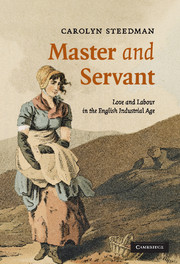Book contents
- Frontmatter
- Contents
- List of maps
- Acknowledgements
- Map 1 Map of the Haworth, Slaithwaite, Huddersfield and Halifax region, 1795
- Map 2 Sketch map of the woollen and worsted producing areas of the West Riding, late eighteenth century
- Prologue
- 1 Introduction: on service and silences
- 2 Wool, worsted and the working class: myths of origin
- 3 Lives and writing
- 4 Labour
- 5 Working for a living
- 6 Teaching
- 7 Relations
- 8 The Gods
- 9 Love
- 10 Nelly's version
- 11 Conclusion: Phoebe in Arcadia
- Bibliography
- Index
4 - Labour
Published online by Cambridge University Press: 06 January 2010
- Frontmatter
- Contents
- List of maps
- Acknowledgements
- Map 1 Map of the Haworth, Slaithwaite, Huddersfield and Halifax region, 1795
- Map 2 Sketch map of the woollen and worsted producing areas of the West Riding, late eighteenth century
- Prologue
- 1 Introduction: on service and silences
- 2 Wool, worsted and the working class: myths of origin
- 3 Lives and writing
- 4 Labour
- 5 Working for a living
- 6 Teaching
- 7 Relations
- 8 The Gods
- 9 Love
- 10 Nelly's version
- 11 Conclusion: Phoebe in Arcadia
- Bibliography
- Index
Summary
The agreement to serve in a domestic capacity and the contract between man or maid and master or mistress (the moment of hiring) constituted the most common labour agreement of the later eighteenth century. It was governed by legislation that originated in the seventeenth century, when the law of service (reformulations of the ancient Statute of Artificers) became inextricably bound up with the newly inaugurated poor laws. The point of connection between these two bodies of law was ‘settlement’: the right of a poor or indigent person to maintenance from the parish to which he or she ‘belonged’, and the obligation of the parish to provide it, if that person could demonstrate a settlement within its boundaries. (Their relief was funded out of a local property tax – a poor rate levied on local householders.)
Settlement was frequently discussed by contemporaries as the patrimony and privilege of the poor, and historians of the old poor law have emphasised this perspective. Pamela Sharpe has claimed that ‘settlement can be seen as a property right for the poor’. Both she and Keith Snell (who refers to some thousand settlement examinations in Annals of the Labouring Poor) outline the many bids and stratagems made by the poor to gain a settlement of their own. By these efforts they chart the course of typical eighteenth-century working lives.
- Type
- Chapter
- Information
- Master and ServantLove and Labour in the English Industrial Age, pp. 66 - 86Publisher: Cambridge University PressPrint publication year: 2007
- 1
- Cited by



